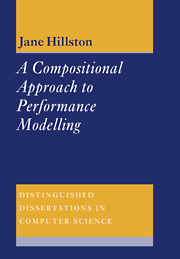Book contents
1 - Introduction
Published online by Cambridge University Press: 24 November 2009
Summary
Performance modelling is concerned with the capture and analysis of the dynamic behaviour of computer and communication systems. The size and complexity of many modern systems result in large, complex models. A compositional approach decomposes the system into subsystems that are smaller and more easily modelled. In this thesis a novel compositional approach to performance modelling is presented. This chapter presents an overview of the thesis. The major results are identified.
A significant contribution is the approach itself. It is based on a suitably enhanced process algebra, PEPA (Performance Evaluation Process Algebra). As this represents a new departure for performance modelling, some background material and definitions are provided in Chapter 2 before PEPA is presented. The chapter includes the motivations for applying process algebras to performance modelling, based on three perceived problems of performance evaluation. The recent developments of timed and probabilistic process algebras are unsuitable for performance modelling. PEPA, and related work on TIPP [1], represent a new area of work, stochastic process algebras [2]. The extent to which work on PEPA attempts to address the identified problems of performance evaluation is explained. The chapter concludes with a brief review of TIPP and other related work.
Chapter 3 presents PEPA in detail. The modifications which have been made to the language to make it suitable for performance modelling are explained. An operational semantics for PEPA is given and its use to generate a continuous time Markov process for any PEPA model is explained.
- Type
- Chapter
- Information
- Publisher: Cambridge University PressPrint publication year: 1996
- 1
- Cited by

